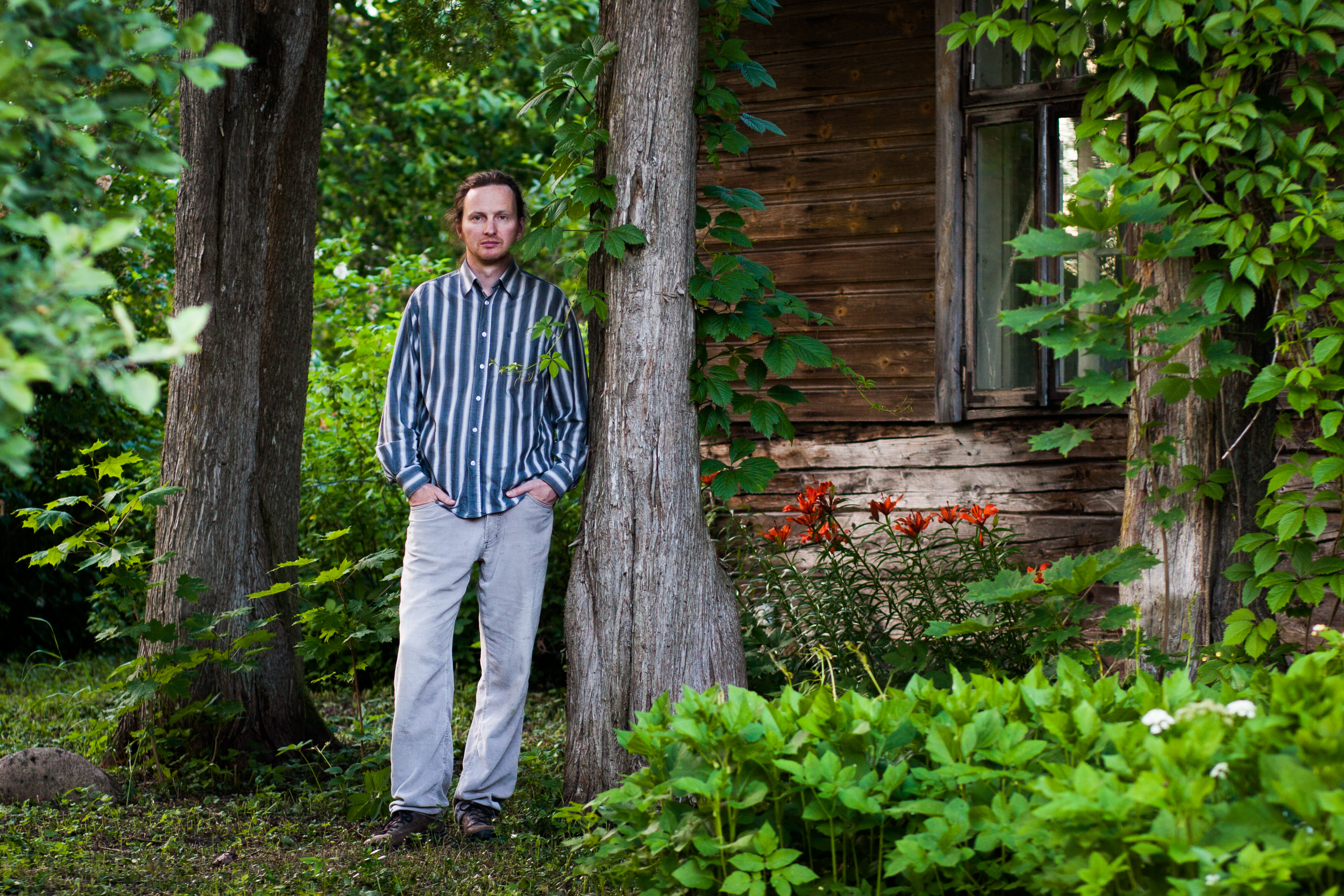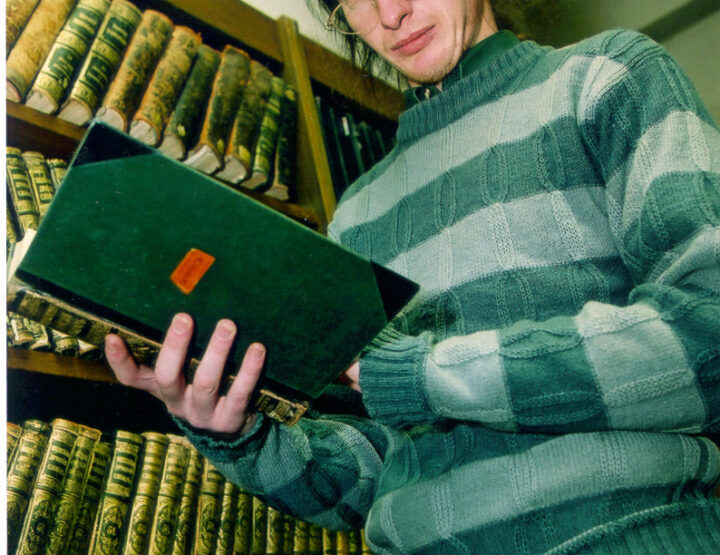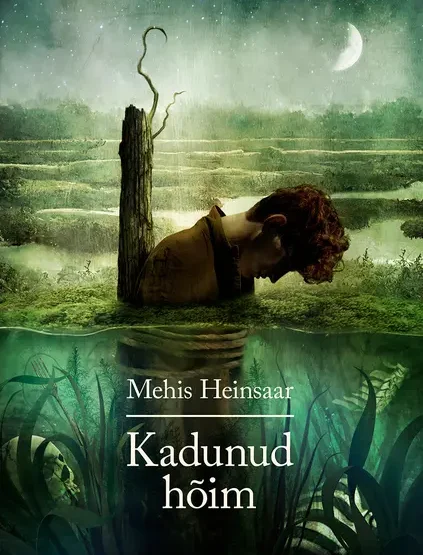Mehis Heinsaar, who is one of the most esteemed Estonian prose writers of the last decade, is likewise one of the chosen few to receive a state writer’s salary. His works have been translated into seven languages – mostly into French – and this year a collection of three of his short stories will be published in English (The Butterfly Man and Other Stories, translated by Adam Cullen and Tiina Randviir, Momentum Books 2018). The author, who has been making a living as a freelance writer his whole adult life, talked about the trials and tribulations of becoming a full-time writer, as well as about how the choice to dedicate oneself to creative pursuits affects relationships and everyday life.
First of all, let’s talk about writing. What type of writer are you?
I’m more the poet-type of writer. I have sudden bouts of inspiration, and then crank out maybe twenty or thirty pages in an hour or two, relying on that inspiration, but then refine it very slowly later on. I rewrite what I’ve written several times to arrive at my envisioned outcome.
Could that also be the reason why you tend to write short prose?
Definitely, yes. My process for writing a novel is very slow and relatively strenuous, all the same. Currently, I’ve been writing one for three years, and there’s no end in sight. I’m working on a “gothic horror novel”, but it’s all kinds of other things, too: it’s a fairy tale, and it has Estonian nature and existentialism – Tartu existentialism. It has very many layers, but I don’t want it to come off as being a certain genre. I’d like it to have a variety of levels and dimensions.
My belief is that if it’s something good or important that’s tied to your personal biography, then you really should spend six or seven years writing that single novel. Even if that comes at the price of not accomplishing several other good ideas. We don’t need the next averagely-good book. We’re already up to our throats in books like that. And anyone who harbors a love for literature actually hates those averagely-good things. As a professional, you can tell immediately where a few pages have been written in, rushed and as filler, just so the novel can move on more quickly – meaning you the reader are actually being deceived. In my opinion, all that is is a waste of a book and a good story. Someone who regards himself as a professional writer and maybe even receives a stipend for writing could, all in all, write much more slowly so that a good story comes out.
Your stories are always very fantastical. How often do you have good ideas that are novel?
Luckily, I’ve been having relatively fewer good ideas than I used to, because it’d be awful to have maybe fifty really good book ideas and, at the same time, know that you’d have to live for three hundred years just to write all of them. At the moment, I have ideas for seven longer stories and four novels, as well as about three hundred draft manuscripts, and I very much hope I won’t get a single great idea in the near future, because I’ll never get around to writing it. But I truly would like to finish writing out the ideas I do have. Alas, I keep coming up with more good short-story ideas constantly.
You’ve written yourself into your works, also. But what do you think: could it just as well be the opposite? Could literature start dictating your life, i.e. could you live your life more haphazardly, and then have more material to write about?
Yes, I’ve certainly found myself having those kinds of moods. But it’s also a dangerous path, living a haphazard life; it might also lead to creative incapacity. There have been periods where I’ve been very disciplined, living ascetically and completely content with simplicity somewhere out in the country. I realize that if I’m good at something, then I should serve that something, and that’s the way I’ve advanced my writing. When I haven’t served it, just putting drafts down on paper and not developing them any further, then my life has quickly gone off in a bohemian direction, and there’ve been periods where I’ve been unable to write anything. As if it were a final stage. There are a ton of examples of writers who have resigned themselves to fate, such as Jack Kerouac, Richard Brautigan, Edgar Allan Poe, Dylan Thomas – alcoholism broke them all. In their youth, writing was the main substance from which they derived pleasure, but in their 40s, for instance, they no longer got such great inspiration. To use the words of Jaan Kaplinski hyperbolically: “How can I go and speak with people when I’ve spoken with gods?”
Are you talking about yourself now, too?
Definitely, in some sense. I’ve inherited a genetic weakness for alcohol from my father, too. I’m not very strong-natured; I often melt into my surroundings, and lose my identity more easily than many others. I lack the spine that some people have grown for themselves or have developed with strict discipline, while others simply have it to begin with. In his routine or everyday life, his gray or even happy quotidian life, a writer can still feel like he’s in the Sahara Desert; he can plod through it, but isn’t happy and content there. His ego might already be so ruined by bursts of inspiration that without them, he’s no longer able to achieve the kind of contact with the mundane and ordinary world that he’d actually like to have.
Inspiration is ease. In a moment of inspiration, you’re walking a tightrope strung across an abyss, and you feel it’s all so easy, that there’s no problem at all. You can even write about difficult times when you outdid yourself, or about someone who’s had a hard life, but you do so driven by inspiration all the same, with some part of your brain which isn’t actual flesh that has to live every second. And when you start living it yourself then, like the protagonist of a rough story, it’s harder, because you haven’t actually gotten your body accustomed to that sort of reality day in, day out. You might find yourself in a mood to resign yourself to fate very suddenly. And if you don’t, then you still endure very difficult hours or days of just tolerating life.
So, you’re saying your struggles take place foremost within and with yourself.
There have been “times of the abyss” of sorts which are so intense in their presence that every passing minute is equal to a day in the desert. They might last for only two or three hours, but they’re so terrible in their intensity that it’s just extremely hard to bear. You don’t know whether you should sit, lie down, or go for a walk. They’re followed by normal hours in turn, which fly past as if you’re sleeping. The relativity of time comes into play here, too. For some people, time is ordinary: the person has such a natural body that they’re on friendly terms with time; time doesn’t bring any surprises. There are no abyss hours and no mountain hours, but also no euphoric God-knows-what hours of ecstasy. That person walks in tempo with time.
Spiritual landscapes are tied to that, too. I do live in Estonia, where everything is flat and there are no earthquakes, but because I possess that kind of poet-like metamorphic and transforming organism, in my spiritual landscape I actually inhabit a volcanic region where earthquakes are pretty common. The landscape that existed yesterday might have undergone an earthquake by tomorrow, and then I’ve got to start working on my garden from square one, all over again; I have to start re-erecting what it may have taken me a month to build. Then, it’s all demolished, because some sort of spiritual earthquake messed it all up. A lot of people put an incredible amount of effort into fitting their internal landscapes to their external ones; effort that someone next to them might not even realize is going on. It’s something a psychiatrist might, of course, simply say is their nerves interacting.
We’ve been discussing mental states, the intellectual, thinking, and cognitions for the most part, but there’s very little here about real life, about your everyday comings and goings. Maybe part of the reason for this is that you live alone and spend a lot of your time alone: you’re able to live within your own mental world more than someone with a family does, for instance. How important to you are your everyday chores, i.e. a regular little trip to the grocery store, and things like that?
I’ve felt that I’m tired of solitude, too. It’s tiring.
But would you like to have kids someday?
That question’s problematic, in turn. I’m someone with weak vitality. I’d spend a ton of energy on a kid, and, I don’t know, maybe a proper paternal feeling would awaken or spawn in me then. There’s no way of knowing before it happens. Quite a lot of dads have said “oh, I had no idea I’d be reborn as a total altruist with the birth of my child.” I can’t know that beforehand. But at the moment, I am that egoist who’s afraid I’ll direct energy towards that and won’t be capable of creative work anymore. So, I guess I’m like a kid myself, a big kid who is jealous of the future kid. And that kid inside of me is fighting the other kid and won’t let him be born. That kid inside of me is afraid I’ll die or will have to turn into that kid’s servant.
If I have a family, then I’ll be giving up the highest level of creative work: that “something” which a good literary work must possess. There’d simply be too little cosmic time left over for perceiving and conveying that “something”.
So, what is that “something”, exactly?
When you read Gogol, Kafka, Baudelaire, Bulgakov, Marques, Calvino, Pessoa, Borghes, you know and perceive what that “something” is.
Are you yourself capable of that “something”?
Yes, I am. I’ve experienced that great wonder while writing, and want to experience the spectacular, cosmic feeling over and over again. And when a writer knows he’s capable of that something, of that literary wonder, then it’s really something to think about… in the sense of whether to prefer “personal” happiness in life, or to dedicate myself to serving that “something”. If I compromise, meaning I am or try to be a writer and am also a hard-working family man all at once, but at the same time can’t manage to perform either duty to the fullest, then the feeling that I’ve failed to live a true life, that I’m an existential invalid, might be much greater. That “something” will remain unachieved in my writing, and that “something” – a sense of true living – will remain unachieved in my family life as well.
Kafka, for instance, strongly acknowledged all of this. And what at first glance might seem like cowardice in his case – all those countless letters of flight, and refusal, and delaying meetings with people, with friends, with girlfriends, those countless flights of his to the bosom of human solitude – all that was actually his courage, his incredible courage to truly be himself as a writer. To go all the way to the limits of himself, down there, and simultaneously up, where not a sound can reach you from the outside anymore, and to be present in that brilliant awfulness, experiencing the best hours of your life amid the deep space of human existence, and only then dedicating yourself to creative pursuits: only the very bravest are capable of that.
Piret Põldver (1985) currently studies Estonian literature at the University of Tartu. She has been a literary critic since 2006, and works as a language editor at a publisher specializing in educational materials.




